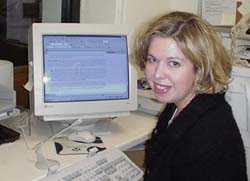Down But Not Out
Inside TC writer Diane Dobry's broken wrist may have slowed her down but it didn't stop her. Here is a first person story of how OASID assisted her.
In honor of National Rollerskating Month this past October, I took a spin on my rollerblades (for the first time in two years) near my home. Because it had been awhile since I last skated, I could not find all my safety equipment. Within ten minutes, while trying to slow down on a hill, I fell backwards and landed on my right hand. My wrist had broken.
Visions of the consequences of an injured right arm rushed through my head. Deadlines looming at work, papers due for my class, events coming up that I had to attend. Now what? Would I have to drop my class? How would I do my writing for work? Who could I ask for help?
I knew Richard Keller and the Office of Access and Services for Individuals with Disabilities (OASID) provide services for students with permanent disabilities. What I didn't know was that OASID also provides help to students with a temporary disability and to TC employees whose ability to work had significantly changed.
I called Keller, and we brainstormed about what assistance I would need. OASID paid someone to take notes for me in class. An abstract for my research paper was due in less than two weeks. Keller provided me with the name and phone number of a research assistant, Charles Klein, whom OASID hires to help people who need assistance with tasks related to doing research.
At work, I was unable to type or write by hand. Keller offered me several options, including voice-recognition software for my writing needs. After installing it on my computer and training it to my own vocal quirks, I dictated stories to my computer and was able to meet my deadlines.
Keller told me of another employee who had a repetitive stress injury and a visual impairment who was struggling with reading and preparing text. "We provided this individual with scanning software and a large computer monitor," Keller said. "That way print scanned from the paper could be altered on the computer screen to make it easier to read."
Another student, Heather Boehmer, also benefited from the voice recognition software program when she needed hand surgery and was in a cast for a short time. Boehmer, a master's student in Organizational Psychology, also works in the OASID office. Yet she said she never would have thought about asking for help until Keller suggested the software. "I just thought I would have to type my papers with one hand," Boehmer commented. "I didn't even think there was any other way to do it and I couldn't afford to pay someone else to do my papers."
Approximately 5 percent of the student population use the services offered by OASID. "I suspect that the services may be underutilized by eligible faculty and staff," Keller noted. "Many people may think that in order to be disabled, you have to be deaf, blind or in a wheelchair. In reality, there are many, many circumstances that would make an individual eligible for the services we offer."
To find out more about services for people with disabilities at Teachers College, call OASID at 678-3689.
Published Tuesday, Sep. 18, 2001
